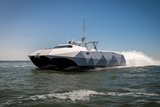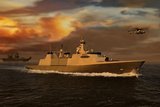Royal Navy grows Remus 100 fleet with latest arrivals
Remus UUV being launched in a UK minehunting trial. (Photo: UK MoD/Crown Copyright)
Huntington Ingalls Industries (HII) has delivered three more Remus 100 uncrewed underwater vehicles (UUVs) to the UK RN for subsea autonomous operations.
‘The new systems bring enhanced endurance and the latest generation of sensors and payloads, allowing for increased data quality and mission efficiency,’ HII claimed in a 21 September statement.
The UK MoD acquired its first pair of Remus 100s in 2002. It operates a mixed fleet of Remus 100 and Remus 600 UUVs for mine countermeasure (MCM) operations.
Cdr Rory Armstrong, mine warfare lead at RN Command Headquarters, said the arrival of the additional UUVs represents ‘an exciting evolution of our existing small autonomous underwater vehicle fleet and will make a valued contribution to the Royal Navy as a force for good both in home waters and on an expeditionary basis’.
In November 2021, the RN took delivery of a different remotely operated USV — called Apollo — from Thales UK, OCCAR and MoD Defence Equipment & Support. The USV is designed for MCM missions in place of existing crewed Hunt- and Sandown-class mine countermeasure vessels.
Related Equipment in Defence Insight
More from Naval Warfare
-
![Spain’s F100 upgrade mirrors Aegis modernisation paths in allied navies]()
Spain’s F100 upgrade mirrors Aegis modernisation paths in allied navies
The Spanish Navy’s Alvaro de Bazan-class of air defence frigates will receive the latest Aegis Weapon System technology among other modernisations to extend the service life to 2045.
-
![UK’s Fleet Solid Support ship programme deemed on track despite steel supply concerns]()
UK’s Fleet Solid Support ship programme deemed on track despite steel supply concerns
Shipbuilders are saying the programme is going ahead on time as the government estimates 7.7 million tonnes of steel are needed for 2026 infrastructure projects.
-
![Raytheon unveils details of its proposal for the US Navy/NATO ESSM Next Significant Variant]()
Raytheon unveils details of its proposal for the US Navy/NATO ESSM Next Significant Variant
In an exclusive interview with Shephard, Raytheon’s VP of Shipboard Missiles disclosed what improvements the company plans to offer for the Sea Sparrow NSV.
-
![US Coast Guard Cutter Polar Star’s 50-year service highlights capability gaps in Antarctica]()
US Coast Guard Cutter Polar Star’s 50-year service highlights capability gaps in Antarctica
Delays in the construction of the Polar Security Cutter – the future substitute for the Polar Star – are likely to prolong the ageing icebreaker’s service time even more, putting the USCG in a risky position.
-
![As Indonesia doubles up its order, who else is looking at the Arrowhead 140 frigate design?]()
As Indonesia doubles up its order, who else is looking at the Arrowhead 140 frigate design?
The adaptable design of Babcock’s Arrowhead 140 frigate, already selected by the UK Royal Navy and Poland, has led to more orders from Indonesia while other countries continue to weigh it up.























